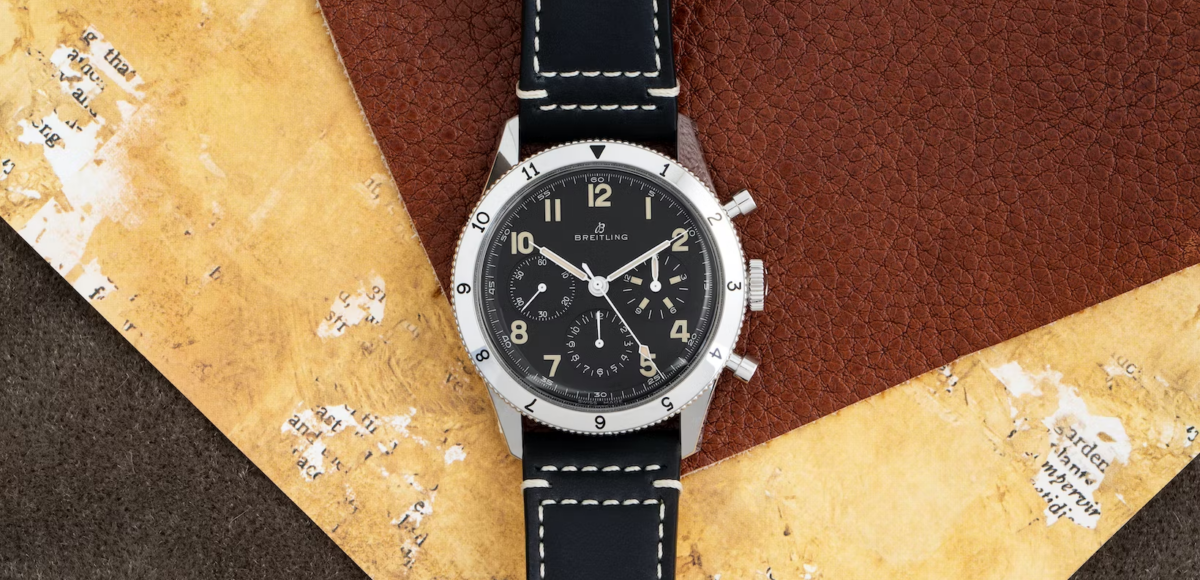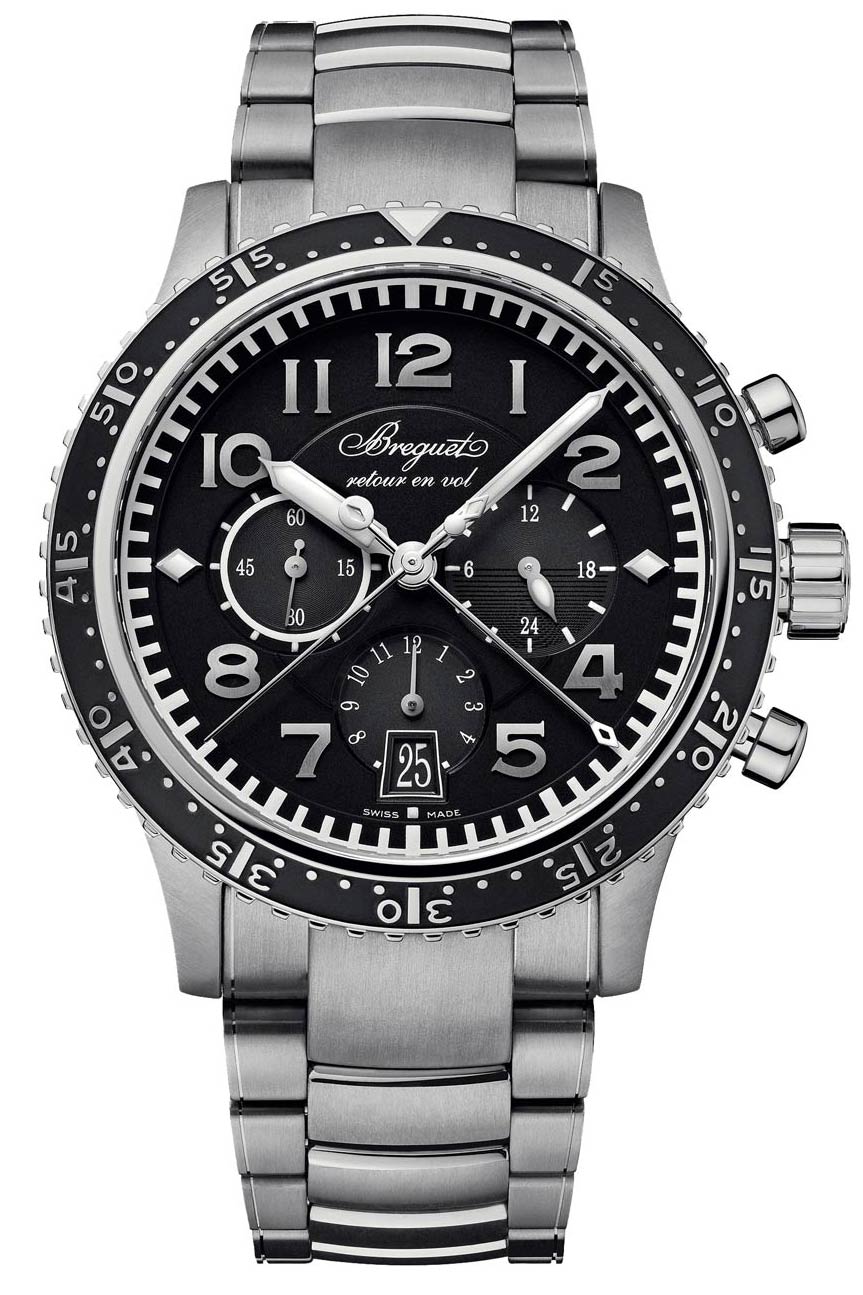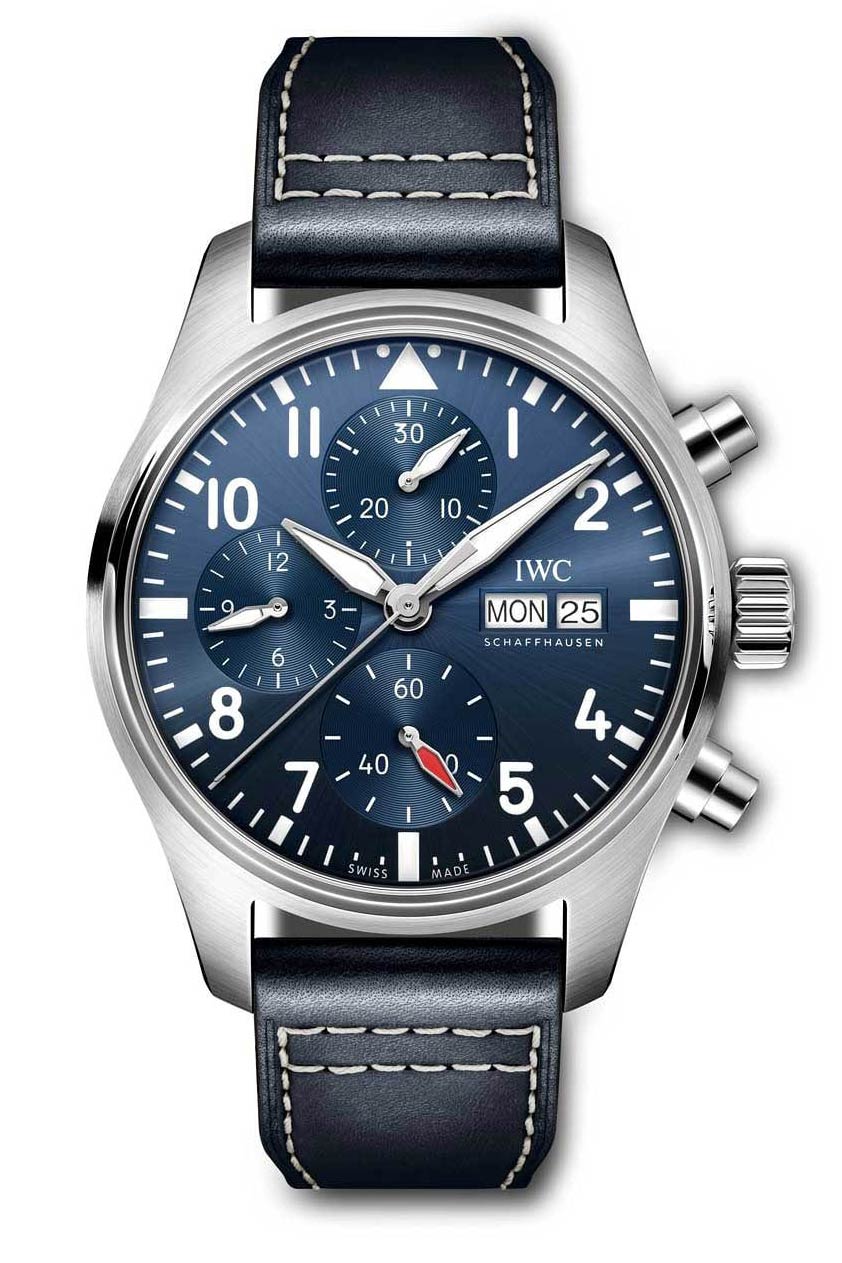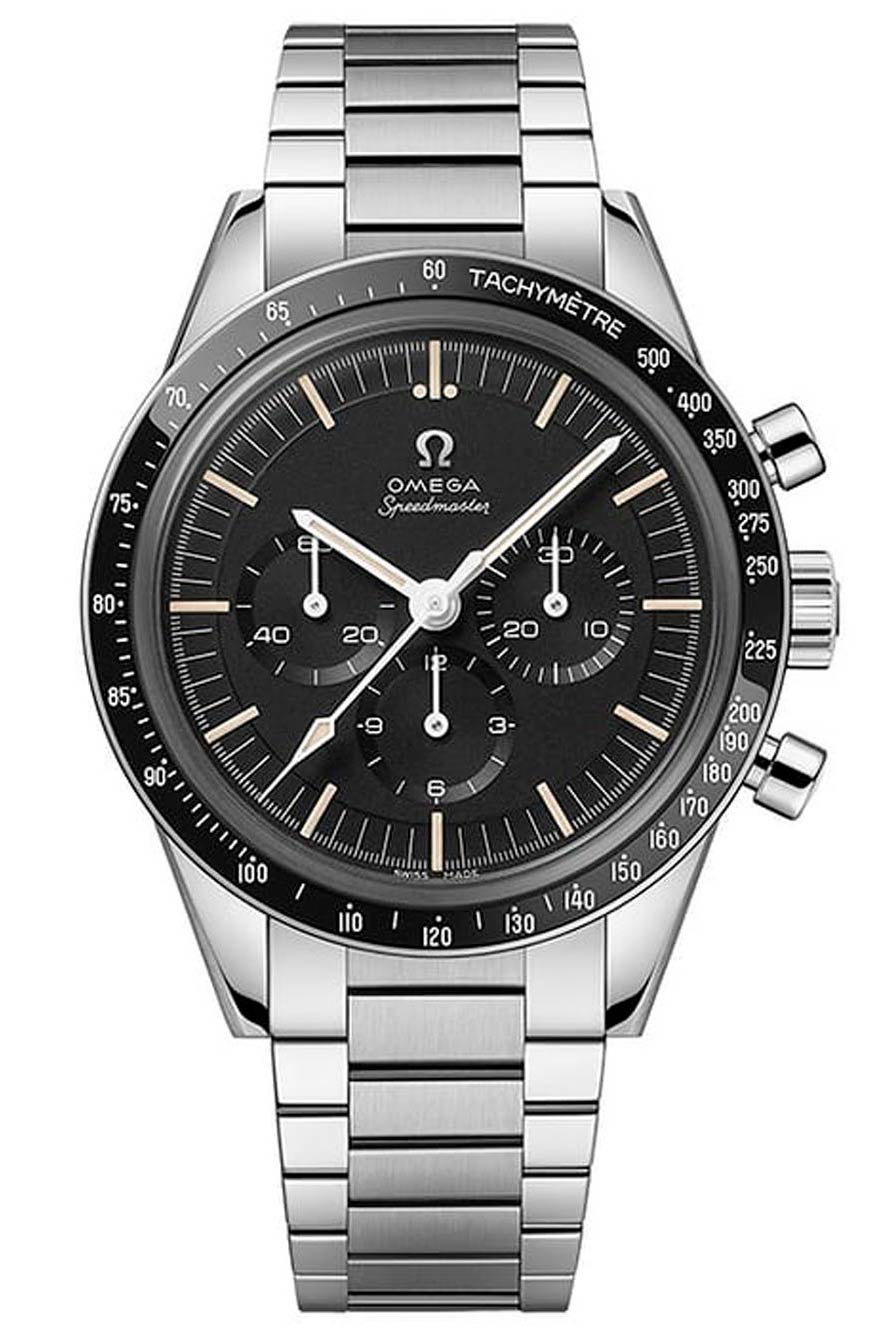A Week On The Wrist The Breitling AVI Ref. 765 1953 Re-edition
A splendidly executed pilot’s watch from the ’50s is once again ready to kick the tires and light the fires.
Nostalgia has a powerful effect on the way we look at the past – it distorts and idealizes what we choose to remember.
Embracing this gives us some latitude in how we analyze modern watches that are inspired by historic designs. When it comes to appreciating the original historic references, we’re not always celebrating the specifics of a design, but rather the era of the watch. Take the Rolex “Paul Newman” Daytona, for instance. The dial legibility is terrible and the build quality of the vintage models compared to the modern models is decent at best. And yet, it’s probably the most-referenced vintage watch since its record-breaking sale. The King of Cool made the watch. Oftentimes we buy into the story and not the watch. And that’s not a bad thing, as many times the stories around watches are far more interesting than the watches themselves.
This phenomenon gives manufacturers a lot of room when it comes to re-interpreting past designs with new watches. And it’s easy to give them a pass on a questionable design if we’re buying into the narrative, the nostalgia.
That’s what makes the new Breitling AVI Ref. 765 1953 Re-edition an interesting release. Even without the ’50s backstory, it’s a damn good watch. It doesn’t use history as a crutch to push the watch and it doesn’t use modernity as an excuse to cut corners when re-interpreting the design. This watch is, in theory, as close to the original 1953 model as Breitling could get while still producing a commercially viable reference.
It’s important to understand that the Breitling of today is nothing like the Breitling of yesteryear. The company has not had a contiguous history since 1884: It was abruptly cut short in 1979 when the brand died as a result of the quartz crisis. Brand president Willy Breitling himself passed away that same year. In 1982 Ernest Schneider re-started the company, but with a slightly different angle, and the range of what is now called “neo-vintage” designs show it.
In the 1940s Breitling was one of the top chronograph producers. Have a look at the sheer number of references, with each reference featuring a new bit of tech and innovation. Alongside the watches was Breitling’s Huit Aviation Department that produced instrumentation for Europe’s leading aviation manufacturers. When the ’50s rolled around, the designs only became more refined and toolish. The proliferation of military jet-powered aviation created a need for watches that could perform with precision, accuracy, and reliability. With numerous patents and decades of experience in chronograph production, Breitling stayed at the head of the pack, with the Chronomat, released a decade before, coming into its own along with the Premier and the stylish Superocean.
The AVI ref. 765 was released in 1953 – as the re-edition’s name suggests – and it featured something very specific to the need of the early jet age: A 15 minute counter at three o’clock meant to time the warm-up procedure and pre-flight checks needed to safely operate the aircraft. This was the era of jet fighters like the F-86 Sabre out of the US and the Hawker Hunter from the United Kingdom. These jets were complex and truly cutting-edge for their time. And so was the Ref. AVI 765. The Venus 178 movement inside, which normally features a 30-minute counter, was rejiggered for the AVI 765’s unique 15-minute counter. It was also 41mm, absolutely massive for its time, to allow for the most legible dial possible. It was produced from ’53 until sometime in the early ’60s, at which point it was replaced by slightly different iterations of the AVI Ref. 765. Louis Westphalen went Hands-On with one of those executions back in 2016.
The AVI Ref. 765 is emblematic of Breitling during the 1950s. With a booming economy on the ground in America and Europe and a sky filled with supersonic booms, Breitling set the standard for applied functionality in aviation watches. And the Breitling of 2020 didn’t forget that.
Almost every watch is a re-interpretation of a previous design. That’s how brands come to be defined by their unique design language, using the same cues over and over again. Breitling calls this watch a Re-Edition, and I think it’s a justified and astute way of naming the watch. Some folks will say that it doesn’t have the spirit of the old model because it incorporates fauxtina (which is “just a color,” sure, but it seems to mostly appear on re-editions or watches meant to pay homage to an older model; its inclusion is usually intentional) and the lack of radium for the lume plots. I had both watches together for a significant amount of time, and if the ’53 model were NOS and hadn’t aged a single day, I would have had a seriously hard time telling them apart. Even the difference in weight between the watches is indiscernible.
Powering the watch is Breitling’s caliber B09. Like the original, it’s a hand-wound column wheel movement. Winding the watch put a smile on my face. The crown is incredibly communicative, and you can feel each click of the ratchet wheel as it advances. You cannot see the ratchet wheel turning, however, because the watch features a solid caseback. A good thing.
Why make the same watch twice almost 70 years apart? Because this formula works. The Kern-led Breitling is discovering what vintage Breitling collectors have known for a long time: Some of the company’s most interesting designs debuted between the ’50s and ’70s. The Navitimer Ref. 806 1959 Re-Edition paved the way when it was released at Baselworld 2019 and Breitling hasn’t stopped since. Look at the success of the Zorro-dialed Top Time re-edition or the Superocean Heritage ’57. After some initial skepticism of Kern’s approach, the collecting community has enthusiastically embraced this retro direction.
Breguet Type XXI 3810
Breguet developed the Type XX for French forces in the ’50s, and like the Breitlings of the same era, those models are incredibly collectible. Additionally, Breguet was heavily involved in the advancement of French aviation. Louis Breguet, son of Antoine Breguet, created an early gyroplane in 1907 and continued aircraft production and design until 1971 when Breguet Aviation merged with Dassault. The airplane I most admire from Breguet Aviation is the 941, a short-lived STOL model that was licensed to McDonell in the US. Only five airframes were ever built, however, and one of them was a prototype.
The Type XX was a 38mm watch, and the Type XXI is a sized-up 42mm re-interpretation of the Type XX design that’s in line with case size trends of today. A modern take on Breguet’s most well-known tool watch design.
It’s a great watch packed with loads of history, but where it deviates from the Ref. AVI 765 in terms of execution is in this sized-up case. It’s not a 1:1 recreation, whereas the Ref. AVI 765 is. The hallmark pilot’s chronograph design cues are all there (Arabic numerals and a triple-register layout on a black dial), but the watch has simply moved a little too far from the original and it’s lost a lot of charm along the way. It costs $13,400 in stainless steel (it also comes in titanium and rose gold) putting it at a significantly higher price point than the Breitling. If you want a Breguet, it’s the obvious choice. If you want a pilot’s watch with loads of history, the Breguet is an option – but a better choice might be to snag the equally historically relevant Breitling at $8,600 and put the rest of the money toward flying lessons.
Sinn Pilot Chronograph 103
Plenty of modern pilot’s watches draw inspiration from mid-century design. Many of the watches are decent in a vacuum but have absolutely zero legitimate histories to back up the use of a classic triple-register pilot’s chronograph design. I consider the Sinn reasonable competition because while it is indeed a much younger brand than Breitling, its history is legitimate.
Sinn issued 1550 flyback chronograph models to pilots of the German Air Force in the ’80s. It’s a standard three-register pilot’s chronograph set-up, but the orientation of the registers is shifted to a 12, 6, and 9 o’clock placement to facilitate the date window at 3. Spiritually it’s similar to the Breitling AVI Ref. 765 1953 Re-edition in terms of the manufacturer taking into consideration the needs of pilots of the era. The 103 series started way back in the ’60s and appeared very similar in design to the original ’53 Ref 765 Breitling, except it used a Valjoux 72. Sinn gave into the fauxtina trend with a 2017 limited version of the 103. That model is long sold out, but the standard 103 St is still being produced. It’s a great alternative to the Breitling if you’re looking for something at a more approachable price point ($2,530 on the strap).
IWC Pilot’s Chronograph 41
If you’re looking at the Breitling because you’re a mid-century aviation nut, then the IWC isn’t for you. It’s more of a modern, generalist pilot watch. But if you’re looking at the Breitling because you’re simply interested in owning a well-designed pilot’s watch with some legitimate history, then the IWC is a worthy contender. Both watches feature in-house calibers, three registers (the IWC gives you a date, too) paired with bold Arabic numerals, and a legitimate skyfaring legacy. The IWC might serve as a better watch for a one-watch collection or an entree into the world of pilot’s watches, but the Breitling has a bit more personality. Even a seasoned watch spotter would have to look closer to ID it from across the room (unless the lume plots on the 15-minute counter give it away), whereas the IWC is immediately obvious.
The Speedmaster Moonwatch 321
While Omega’s marketing department has pushed the Speedmaster as the moon watch for decades, we can’t forget that it’s remained a popular watch among pilots as well since its inception – many of the Apollo-era astronauts were test pilots before they were astronauts. And it has plenty in common with the AVI Ref. 765 1953 Re-edition, even though the Speedy lacks Arabic numerals on the dial.
Breitling’s caliber B09 uses the same basic column-wheel design as the 321, which is based on the old Omega cal. 321 found in the original Speedmaster. Both watches are as true to the original as they can be in a modern context. These watches are exercises in using cutting-edge manufacturing techniques to go backward in time. The Speedmaster is just under twice the price of the Breitling at a whopping $14,100, but it’s about ten times as well-known. With the Speedy, you’re buying into the moon history and the aviation history as well – but if the advent of the moon landing doesn’t captivate you in a way that’s drastically greater than the way pilots of ’50s experimental fighter jets breaking the sound barrier does, then the Breitling is certainly the better value.
Talk to Breitling collectors and they’ll be sure to tell you how the “old” Breitling is vastly superior to the “new” Breitling. And frankly, before wearing the AVI Ref. 765 1953 Re-edition I would’ve wholeheartedly agreed. The watches back then were built with a specific purpose in mind, and some fantastic designs arose from the functional demands of the time, like the quirky 15-minute counter on the original AVI Ref. 765. All of this context is exactly why I find the new AVI Ref. 765 so compelling. It’s not a watch that needs to make an egregious compromise to resurrect the former glory of the model. It wears wonderfully on my 7.25-inch wrist, and I don’t feel the need to baby it like I would the older model. Now all I need is an F-104 to see if I can get it fired up in 15 minutes.
A special thanks to Bruno at OC Tanner in Salt Lake City and collector Eberhardfan.
Get More Articles Like This in Your Inbox
We're constantly creating great content like this. So, why not get it delivered directly to your inbox? By subscribing you agree to our Privacy Policy but you can unsubscribe at any time.





























